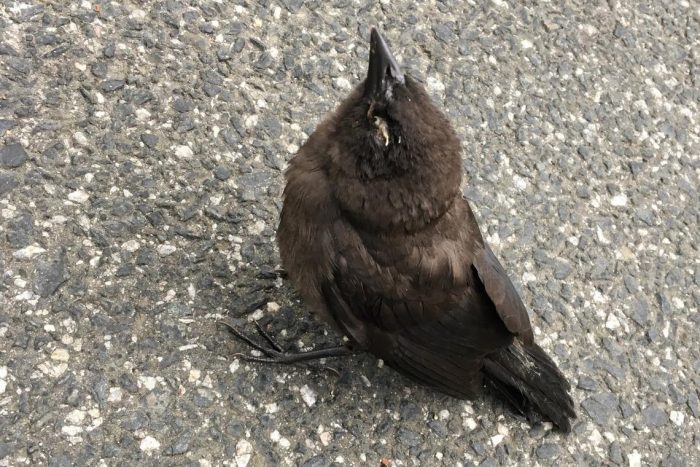Scientists Investigate Mysterious Songbird Deaths in Delaware, Several Other States and D.C. Area
Department of Natural Resources and Environmental Control | Division of Fish and Wildlife | Date Posted: Wednesday, June 30, 2021
Department of Natural Resources and Environmental Control | Division of Fish and Wildlife | Date Posted: Wednesday, June 30, 2021

Photo Credit: National Parks Service photographer Leslie Frattaroli
Public Advised to Temporarily Remove Feeders and Bird Baths
State and federal wildlife experts and wildlife rehabilitators are investigating reports in at least six mid-Atlantic and central states, including Delaware, of sick and dying songbirds stricken by an unknown disorder characterized by swollen eyes with crusty discharge, as well as neurological signs such as erratic flight and stumbling. The Department of Natural Resources and Environmental Control has observed similar symptoms in Delaware’s avian population and more than 50 dead birds have been reported.
Juvenile birds appear to be more affected than adults, with European starlings, blue jays and common grackles as the species most associated with the debilitating event. Investigating agencies including DNREC are working cooperatively with animal health laboratories to find what’s behind this event, with Delaware’s samples sent to the Pennsylvania Animal Diagnostic Laboratory in New Bolton Center, Pa., but no definitive cause has been identified to date.
Although the cause of the event is not yet known, wildlife health experts believe congregating birds may contribute to its spread. Federal and state wildlife experts recommend anyone who keeps bird feeders or bird baths in their home landscape take the following precautions to help manage the event:
If residents observe a live wild bird exhibiting the symptoms as described above, they may contact Tri-State Bird Rescue & Research at 302-737-9543. Additional information can be found on its website at tristatebird.org. If residents find a dead wild bird they suspect displayed any of the above-mentioned symptoms, contact the DNREC Division of Fish and Wildlife at 302-735-3600.
About DNREC
The Delaware Department of Natural Resources and Environmental Control protects and manages the state’s natural resources, protects public health, provides outdoor recreational opportunities, and educates Delawareans about the environment. The DNREC Division of Fish and Wildlife conserves and manages Delaware’s fish and wildlife and their habitats, and provides fishing, hunting, wildlife viewing and boating access on nearly 65,000 acres of public land. For more information, visit the website and connect with @DelawareDNREC on Facebook, Twitter or LinkedIn.
Media Contacts: Nikki Lavoie, nikki.lavoie@delaware.gov; Michael Globetti, michael.globetti@delaware.gov
Related Topics: bird disease, outdoors and recreation, permitting and regulation, song birds, wildlife
Keep up to date by receiving a daily digest email, around noon, of current news release posts from state agencies on news.delaware.gov.
Here you can subscribe to future news updates.
Department of Natural Resources and Environmental Control | Division of Fish and Wildlife | Date Posted: Wednesday, June 30, 2021

Photo Credit: National Parks Service photographer Leslie Frattaroli
Public Advised to Temporarily Remove Feeders and Bird Baths
State and federal wildlife experts and wildlife rehabilitators are investigating reports in at least six mid-Atlantic and central states, including Delaware, of sick and dying songbirds stricken by an unknown disorder characterized by swollen eyes with crusty discharge, as well as neurological signs such as erratic flight and stumbling. The Department of Natural Resources and Environmental Control has observed similar symptoms in Delaware’s avian population and more than 50 dead birds have been reported.
Juvenile birds appear to be more affected than adults, with European starlings, blue jays and common grackles as the species most associated with the debilitating event. Investigating agencies including DNREC are working cooperatively with animal health laboratories to find what’s behind this event, with Delaware’s samples sent to the Pennsylvania Animal Diagnostic Laboratory in New Bolton Center, Pa., but no definitive cause has been identified to date.
Although the cause of the event is not yet known, wildlife health experts believe congregating birds may contribute to its spread. Federal and state wildlife experts recommend anyone who keeps bird feeders or bird baths in their home landscape take the following precautions to help manage the event:
If residents observe a live wild bird exhibiting the symptoms as described above, they may contact Tri-State Bird Rescue & Research at 302-737-9543. Additional information can be found on its website at tristatebird.org. If residents find a dead wild bird they suspect displayed any of the above-mentioned symptoms, contact the DNREC Division of Fish and Wildlife at 302-735-3600.
About DNREC
The Delaware Department of Natural Resources and Environmental Control protects and manages the state’s natural resources, protects public health, provides outdoor recreational opportunities, and educates Delawareans about the environment. The DNREC Division of Fish and Wildlife conserves and manages Delaware’s fish and wildlife and their habitats, and provides fishing, hunting, wildlife viewing and boating access on nearly 65,000 acres of public land. For more information, visit the website and connect with @DelawareDNREC on Facebook, Twitter or LinkedIn.
Media Contacts: Nikki Lavoie, nikki.lavoie@delaware.gov; Michael Globetti, michael.globetti@delaware.gov
Related Topics: bird disease, outdoors and recreation, permitting and regulation, song birds, wildlife
Keep up to date by receiving a daily digest email, around noon, of current news release posts from state agencies on news.delaware.gov.
Here you can subscribe to future news updates.